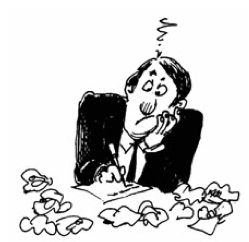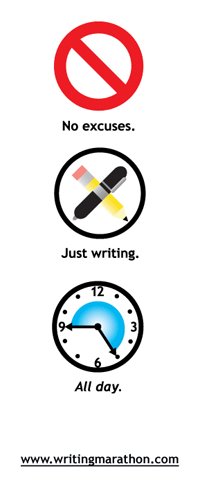 According to the U.S. National Weather Service, the odds of being struck by lightning in your lifetime are 1 in 6,250.
According to the U.S. National Weather Service, the odds of being struck by lightning in your lifetime are 1 in 6,250.
I like those odds.
In fact, I believe that’s the BIGGEST secret to a successful creative practice.
Making yourself more strikeable.
I first learned about this concept from my pal, Don The Idea Guy. Possessing creative powers beyond those of mere mortals, Don rescues those in need of innovative ideas through his brainstorming sessions, articles, websites, books and presentation. He’s been interviewed by the New York Times, quoted in FastCompany, and served as the first president of the International Idea Trade Association.
When asked about how to become more strikeable, he wrote:
“Waiting for inspiration? Puh-leeeze. You may as well wait for lightning to strike. As a matter of fact, you’ve probably heard a flash of brilliance described that way – as a lightning strike. And the worst offenders of this ‘wait-and-see’ approach to inspiration are the people who’ve experienced a flash of insight in the past.”
“And I’m not saying the occasional lightning strike doesn’t happen,” said Don, “I’m just saying the odds are against it.”
The secret, then, of making yourself more strikeable, is to make yourself into a human lightning rod.
“Lightning rods provide an easy path for creativity to find its way to your brain, but you gotta be holding them – using them – in order for the creative lightning to strike YOU instead of dissipating harmlessly into the ground,” explained Don.
Here is a collection of practices for making yourself more strikeable:
1. Make room. Often times the problem of a creative mind is not the lack of ideas, but an over abundance, says Don. “There are so many ideas swimming around in your noggin that you don’t know which one to act upon first. It can get congested up there, and if you don’t find a release valve your brain can get more clogged than a summer sinus infection.”
Your challenge is simple: Make sure everything you know is written down somewhere. You memory is a moron. Don’t depend on it. Get every idea down as soon as it comes to you. Don’t judge whether or not it’s good. Just get it down. Because if you don’t write it down, it never happened. And you can’t use what you can’t find.
2. Position yourself to be struck. The U.S. National Weather Service also reported that out of the thousand people that are injured by lightning each year (oddly enough, most of whom live in Florida, aka, “The Lightning Capital of the World”), one third of all injuries occur during work, another third of injuries occur during recreational or sports activities, and the last third occurs in diverse situations, including injuries to those inside buildings.
Therefore: The secret is putting yourself in the best possible position for lightning to strike. After all, you can’t expect to be zapped while sitting on your couch every day. Now, I’m not suggesting you relocate to Florida. But getting out of the house and into the world is crucial component to supporting, enriching, inspiring and informing your work.
You GET ideas, as the raw materials for your work are everywhere. You SHARE ideas, as you bounce them off other for feedback. You ROUND OUT ideas, as new experiences add new dimensions to existing thoughts. Remember: Real art can’t be created in a vacuum.
3. Become idea safe. www.StruckByLightning.org is a Massachusetts-based non-profit corporation that promotes lightning safety. Their mascot, Leo the Lightning Lion, says that prevention is key. “No place outside is safe in a thunderstorm,” he said. Now, he reminds kids and adults alike of this truth with a variety of memorable slogans. So, what I’ve done is flipped each one with a challenge question as it pertains to becoming more strikeable:
• “When thunder roars, go indoors!” What are the signs of a brewing creative storm, and how do you respond to them?
• “Don’t be lame, end the game!” Are you quitting too early during your creative sessions, thus preventing the best ideas from surfacing?
• “Don’t be a fool, get out of the pool!” How often are you swimming in your pool of ideas?
• “Use your brain, don’t wait for the rain!” Are you waiting on inspiration or depending on discipline?
4. Creativity is a function of awareness. In the Wikipedia entry about lightning,, I also discovered this piece of trivia: “Pine trees usually stand taller than other species, which also makes them a likely target for lightning strikes. Additionally, factors that lead to its being targeted include: High resin content, loftiness, and its needles that lend themselves to a high electrical discharge during a thunderstorm.”
Pine trees know what they’re doing. They have all the characteristics of a strikeable plant. The question is: What attributes do YOU embody that make you a likely target? Don suggests awareness as the essential element:
“I used to believe my primary source for attracting creative ideas was curiosity. It turns out that attribute most of my idea generation to awareness – simply being attuned to what’s happening around me and absorbing these influences and seeds of ideas into my mind.”
Therefore: Think of your brain as a magnet. Invite innovative influences as metal shavings, collect enough metal and you can create a helluva lightning rod.
5. Discard evaluative tendencies. Treat every idea, every experience and every thought with deep democracy. I learned this practice from one of the coolest books ever written on creativity, Unintentional Music. Author Layne Arye suggests we value everything whether it was intended or not. “Let all the different parts of the idea express themselves and influence your creative decisions. Be deeply democratic by listening to – and valuing – all parts.”
Therefore: Stop telling yourself, “Well, if I don’t remember it when I get home, it couldn’t have been that important.” That, right there, is the fatal flaw. That, right there, is where most people go wrong. If you make an appraisal of your idea before it’s even written down, you’re assuming and operating on the assumption that how good or bad an idea is, (especially in the early stages of that idea’s development), actually matters.
It doesn’t. Good or bad means NOTHING. Assigning value to your ideas before they’ve been brainstormed, explored and expanded is a creative block. This causes you to fall victim to premature cognitive commitment, which prevents your idea from blossoming into its truest and strongest potential.
The idea isn’t “good.” The idea isn’t “bad.” The idea simply IS. That’s it. No adjectives allowed. Stop judging. Stop evaluating. Stop appraising. Write everything down, as soon as it enters into your brain. Don’t worry how amazing, how ridiculous or how insane the idea sounds, just get it down.
6. Learn to strike out. In my research on lightning, the most fascinating story was that of Roy Cleveland Sullivan (February 7, 1912 – September 28, 1983). He was a U.S. Park Ranger in Shenandoah National Park in Virginia. Between 1942 and 1977, Sullivan was hit by lightning on SEVEN different occasions – and survived all of them.
Naturally, he earned the nickname “Human Lightning Conductor” and “Human Lightning Rod.” Sullivan is recognized by The Guinness Book of World Records as the person being struck by lightning more recorded times than any other human being. Interestingly, each of Sullivan’s lightning strikes is documented.
As you read these, consider the implications in terms of strikeabilty and how you might repeat parallel circumstances in your own creative practice. Again, each item is flipped with a challenge question:
• April 1942. He was hiding from a thunderstorm in a fire lookout tower. Are you standing at the highest point of visibility to expose yourself to the best creative light?
• July 1969. The lightning first hit nearby trees and was deflected into the open window. Whose creativity could you deflect into your atmosphere just by being around them more often?
• September 1970. While in his front yard, the lightning hit a nearby power transformer and then jumped to his left shoulder, searing it. What three “hot spots” – coffee shops, art museums, strip clubs – could you stand in proximity of to maximize strikeabilty?
• March 1972. Struck while working inside a ranger station in Shenandoah National Park. It set his hair on fire. When was the last time you set your creativity on fire? What kindling steps led to that? How could you repeat them?
• August 1973. While he was out on patrol in the park, Sullivan saw a storm cloud forming and drove away quickly, even though the cloud, he said later, seemed to be following him. Soon after, a lightning bolt struck him. What affirmations could you recite each morning that would attract lightning into your atmosphere?
• June 1976. He saw a cloud, thought that it was following him, tried to run away, but was struck anyway. What if, instead of running from the lightning, you partnered with it?
• June 25, 1977. Sullivan was fishing in a freshwater pool when he was struck the seventh time. The lightning hit the top of his head, singeing his hair, and traveled down burning his chest and stomach. What conductor could you immerse yourself in for an extended period of time to increase the chances of being struck?
Sadly, Roy Sullivan died from a self-inflicted gunshot wound to the stomach at the age of 71.
Upon hearing the sad news, his friends and family members were “shocked.”
REMEMBER: Lightning strikes twice, three times and ALL the time if you learn how to turn yourself into a lightning rod.
LET ME ASK YA THIS…
How strikeable are you?
LET ME SUGGEST THIS…
For the list called, “9 Things Every Writer Needs to Do Every Day,” send an email to me, and you win the list for free!
* * * *
Scott Ginsberg
That Guy with the Nametag
Author, Speaker, Coach, Entrepreneur
[email protected]
 Need to build your Thought Leadership Platform?
Need to build your Thought Leadership Platform?
Perhaps my monthly (or yearly) coaching program would help.
Rent Scott’s Brain today!

 Do you need an expert who tells you what to do, or a mentor who lets you tell yourself what to do?
Do you need an expert who tells you what to do, or a mentor who lets you tell yourself what to do?
 Yesterday we explored
Yesterday we explored 
 My definition of writing is as follows:
My definition of writing is as follows: According to the U.S. National Weather Service, the odds of being struck by lightning in your lifetime are 1 in 6,250.
According to the U.S. National Weather Service, the odds of being struck by lightning in your lifetime are 1 in 6,250. 1. Brainstorming is the great time-waster. You don’t need another meeting. You don’t need another conference call. And you don’t need to spend another afternoon talking the life out of your idea. You need to take massive action. Today.
1. Brainstorming is the great time-waster. You don’t need another meeting. You don’t need another conference call. And you don’t need to spend another afternoon talking the life out of your idea. You need to take massive action. Today.  Here’s a question my readers, audience members and clients often ask me:
Here’s a question my readers, audience members and clients often ask me: 1. Be due at the page. Go to your rendezvous point every day, sit down and write. Enter the gentle fire, scrape down to your bones and immediately start dancing across the page. Crank the valve of your inner wellsprings and currents, sit with your search and start mining some nuggets.
1. Be due at the page. Go to your rendezvous point every day, sit down and write. Enter the gentle fire, scrape down to your bones and immediately start dancing across the page. Crank the valve of your inner wellsprings and currents, sit with your search and start mining some nuggets.  Inspired by Natalie Godlberg’s Writing Down the Bones, this December I’ll be hosting the first (of many, hopefully…)
Inspired by Natalie Godlberg’s Writing Down the Bones, this December I’ll be hosting the first (of many, hopefully…) 